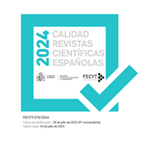Tradicionalidad discursiva y formularidad del (inicio de) turno en la literatura dialógica a lo largo de la historia del español
Resumen
En este artículo tendremos en cuenta algunas fórmulas típicas de inicio de turno o constituyentes exclusivas de turno en la historia de la literatura española. Estudiaremos la continuidad de la fórmula desde el latín y la variación diacrónica en función de preferencias discursivas (por ejemplo, en lo que respecta a la función de tópico/foco) y sistemáticas (sustitución de esquemas gramaticales, preferencias sintácticas, obsolescencia léxica, etc.). El análisis permitirá comprender la importancia de ciertas tradiciones literarias para la habitualización de determinadas fórmulas, sin olvidar que el diálogo, como categoría (macro-) genérica, es transversal a diferentes subgéneros. Por otro lado, se insistirá en la relevancia del siglo XIX como período clave en la evolución de la oralidad elaborada gracias a la proliferación de la comedia, incluidas las traducciones de los comediógrafos latinos. Concluiremos que las fórmulas dialógicas son manifestación de una tradicionalidad supraidiomática que, en numerosos casos, ha resultado invisible al investigador.
Descargas
Descarga artículo
Licencia
La revista Círculo de Lingüística Aplicada a la Comunicación, para fomentar el intercambio global del conocimiento, facilita el acceso sin restricciones a sus contenidos desde el momento de su publicación en la presente edición electrónica, y por eso es una revista de acceso abierto. Los originales publicados en esta revista son propiedad de la Universidad Complutense de Madrid y es obligatorio citar su procedencia en cualquier reproducción total o parcial. Todos los contenidos se distribuyen bajo una licencia de uso y distribución Creative Commons Reconocimiento 4.0 (CC BY 4.0). Esta circunstancia ha de hacerse constar expresamente de esta forma cuando sea necesario. Puede consultar la versión informativa y el texto legal de la licencia.











